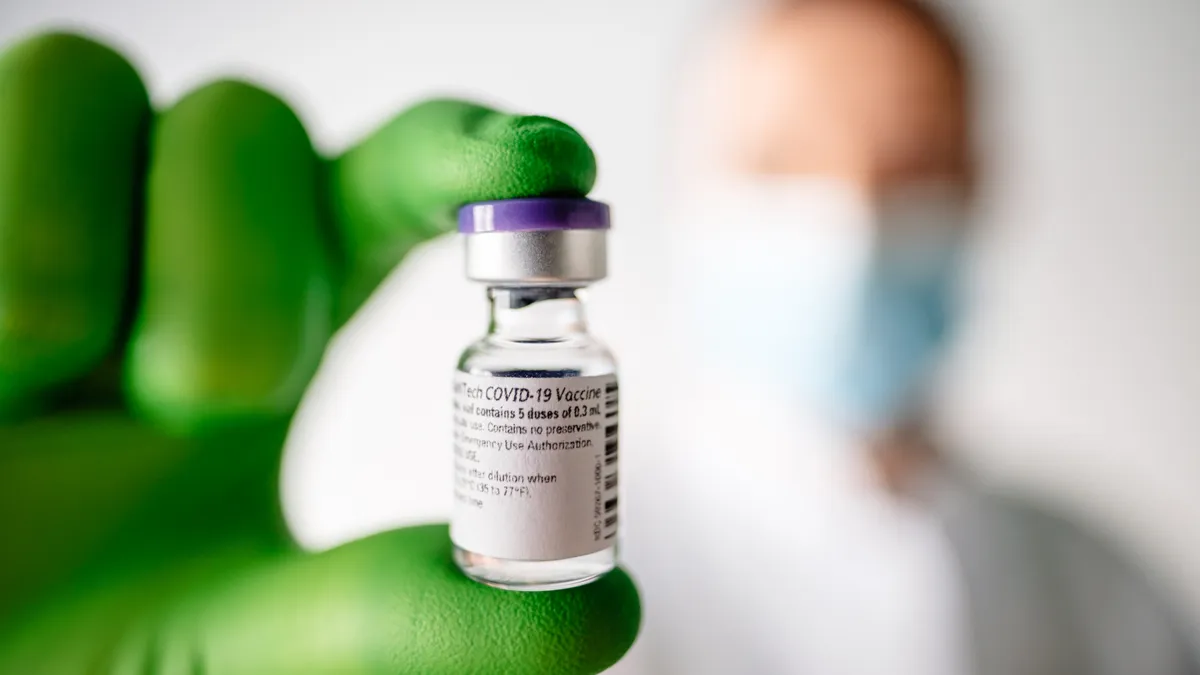The Biden administration's first week in office included the release of a 200-page outline for fighting the COVID-19 pandemic. Among several measures, it says the administration will provide authority, through an executive order issued Thursday, to use the Defense Production Act to "fill supply shortfalls" across 12 product categories facing shortages.
The DPA is a legal tool the federal government uses to ensure suppliers prioritize its orders. It can allow the government to direct expanded manufacturing capacity at particular companies, as it did in April, when the Department of Health and Human Services announced a $489.4 million DPA contract with General Motors to manufacture 30,000 ventilators for the Strategic National Stockpile. But it's not clear how helpful this order was, as this work was taking place prior to the DPA order.
White House Press Secretary Jen Psaki said Friday during a press briefing that the DPA has been put into effect.
"It can be a very powerful tool," said Aron Beezley, a partner at Bradley, in reference to the DPA, though he also said it's "not the magic cure-all that some think it is."
The six vaccine candidates being developed as part of Operation Warp Speed portfolio — Moderna, AstraZeneca, Novavax, Jannsen, Sanofi and Pfizer — have priority DPA ratings. Companies manufacturing therapeutic treatments also have priority ratings. As of Dec. 31, there were 18 priority ratings issues under the DPA, according to a post by the Defense Department.
A White House spokesperson was not able to provide Supply Chain Dive with the names of companies that have received new DPA-rated orders.
The Biden administration's strategy document notes that supply chains are facing shortages of several types of personal protective equipment and supplies related to COVID-19 vaccines and testing, including N95 masks, isolation gowns, nitrile gloves, swabs, rapid test kits and others items, as well as "all the necessary equipment and material to accelerate the manufacture, delivery, and administration of COVID-19 vaccine."
The White House has not revealed the specific products or companies on which agencies will use the DPA. But "it has been invoked," Psaki said of the DPA. "So, those processes are now rapidly ongoing."
Orders move to the front of the line
"The Defense Production Act is the government's ability to direct rated orders," Beezley said, which means its orders are a priority over commercial orders. The DPA's power comes from the fact that a company can be found guilty of a crime and fined up to $10,000 if it doesn't comply with the orders given under the law, he said.
Companies that receive DPA orders from the government will usually get some sort of advanced warning that the formal directive outlining the terms is coming, Beezley said.
The DPA also provides for allocation authority, which allows the government to direct companies to reserve materials, services or facilities in anticipation of a rated order. The DPA provides legal protection to the manufacturer so other customers whose orders are held or delayed can't sue.
"Section 707 of DPA provides immunity from suits for damages so they cannot successfully sue you, so long as your failure to supply is directly connected to your DPA order," said Sarah Rathke, a partner at Squire Patton Boggs who focuses on manufacturing litigation and supply chain disputes.
The power of the DPA can also be used to expand manufacturing capacity at private companies. The federal government would provide the funds to do this, Rathke said.
"The administration could even augment private manufacturing facilities by installing federally owned equipment if required to increase drug production," three Harvard Medical School researchers wrote in an American Journal of Public Health editorial on the use of the DPA to fight drug shortages, published in September.
It can also help the government get proprietary information from companies that they might not normally be willing to share, to help the government to understand where shortages are occurring and what's causing them.
From the outside, it can be hard to tell which products would benefit from DPA the most without knowing what the specific production or supply chain issues are, Rathke said.
"That said, the whole benefit of a DPA order is you can flow it down your entire order chain, so if there are bumps, it can be applied," she said.
Suppliers are bound, too
When a company receives a rated order under the DPA, it is legally required to let the government know if it cannot comply. If it can, then it will need to pass along the order to its suppliers, which are also legally required to comply.
"If the order directs the fulfillment of an order by a certain date, and the supplier gets that order and they physically can't do it, it's not possible, then they need to immediately notify the person ... who issued that order that they can't do it by the date specified," Beezley said.
The government has said it assists in the management of this process and the coordination with suppliers.
"In order to aggressively and legally maximize the benefit of the Defense Production Act for U.S. national defense, while minimizing impact on other companies and other products, each priority rating is meticulously managed by Operation Warp Speed leaders and logistics experts, in coordination with each company and their up-stream suppliers," Operation Warp Speed Senior Counsel Gregory Gillette said in a statement last year.
When it's communicated that a supplier doesn't have enough capacity, this is where the other tools within DPA, such as the ability to provide financing for capacity expansion, can be helpful. But this also highlights the practical limits of the DPA.
"The DPA isn't a magic wand. It can't magically solve the supply chain problems that we may encounter with a vaccine," said Rathke. "People can only do what they can do."
Another limit of the law is the fact that it only works if the company is based in the United States. This could be an issue for PPE, which is often sourced from companies outside of the country with many face masks coming from China and Taiwan and gloves imported from Malaysia.
"If a company is fully outside of the United States, and they're an integral part of a supply chain that is subject to a rated order, for instance, and that company has no interest in complying, there's not much the government can do," Beezley said.























